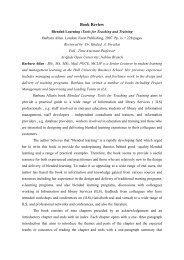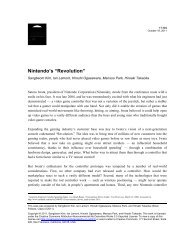07313.16293
You also want an ePaper? Increase the reach of your titles
YUMPU automatically turns print PDFs into web optimized ePapers that Google loves.
think they have a reasonable chance of winning prize<br />
money. Practice usually consists of 1) playing against other<br />
teams and 2) discussing strategies and tactics within the<br />
team. Most teams we talked to practice just enough to<br />
qualify to different events – and might not practice at all if<br />
there aren’t any serious opponents in their country (see<br />
further below).<br />
When they practice, most teams prefer to meet physically<br />
and play matches against other teams over the Internet.<br />
Only teams whose members live far from each other and/or<br />
cannot afford to travel practice online. Practice is also<br />
related to the infrastructure in a country. Ping-rate or<br />
network lag is a crucial factor in CS and teams that don’t<br />
have access to fast interoperable Internet connections (e.g.<br />
India) are practically barred from playing against other<br />
teams online and are thus severely limited in their choices<br />
of “sparring partners”. A team that has limited opportunities<br />
to practice against other teams, or limited opportunities to<br />
meet physically and practice together will tend to develop<br />
more slowly no matter how good the team might be<br />
theoretically. This illustrates a “network effect” of sorts in<br />
terms of close learning-teaching relationship within and<br />
between teams as well as the importance of factors such as<br />
broadband penetration and telecommunications infrastructure.<br />
3) Players and fans on the Internet<br />
As with other popular computer games, there are countless<br />
community-sites dedicated to CS. The fact that the game is<br />
also played as a competitive sport does however make a<br />
difference. Some CS clan sites can best be described as fansites,<br />
other sites are dedicated to presenting results and<br />
interviews with players and yet others offer the possibility<br />
of gambling (!). Fragbite is the most popular Swedish news<br />
and community-site and it reaches a large part of the<br />
Swedish CS-scene. Fragbite started 2002 and its archives<br />
mirrors the evolution of the Swedish and international CSscene.<br />
In our analysis here we focus on 1) discussions at<br />
Fragbite about how CS should be played, 2) how the<br />
activity of playing is valued and understood by community<br />
members and 3) how these ideas, opinions and values form<br />
discursive identities which players can draw upon in their<br />
attempts of making sense of their own gaming activities.<br />
Only part of our results is presented here, a full analysis<br />
will be published (in Swedish) elsewhere [18]. The two<br />
dominant discourses of identity in the community forum are<br />
those of professionalism and athleticism. The professional<br />
identity is expressed in the concern of the community to<br />
come off as serious, dedicated and mature with a clear goal<br />
and vision: to turn CS into an accepted sport with chances<br />
for practitioners to make a living from playing the game.<br />
Appeal to excellence, physical fitness, endurance, practice<br />
and hard work constitutes the basis for a discourse of<br />
athleticism. These two discourses might or might not be<br />
dominant on the CS-scene as a whole; we call attention to<br />
them here because they are important to the overall<br />
evolution and professionalization of CS and because they<br />
tie in with other parts of the CS scene analyzed here.<br />
Discourses of professionalism and athleticism furthermore<br />
constitute powerful counter-discourses to prevailing<br />
opinions about the dangers of computer games. An example<br />
of the latter is the description in one of Sweden’s biggest<br />
newspapers of the computer festival Dreamhack<br />
(www.dreamhack.se) as a “computer game convent but also<br />
a ghost fair, for the image here offered is a horrifying vision<br />
of the future of humanity: cybernetic and withered, rushing<br />
and snorting across an artificial savanna” [28].<br />
The discourses of professionalism and sport transform the<br />
activity of playing a computer game into work rather than<br />
play. This connection has been noted also by others<br />
[12,29,31] but rarely in the highly positive manner offered<br />
by these player-created discourses. The connection between<br />
work and play is here used to invert the image of the<br />
“horrifying vision” above into something that borrows both<br />
from the bureaucrat and the entrepreneur; planned and<br />
diligent work combined with expansive visions for the<br />
future. The common image of the couch potato “wearing<br />
thick, unflattering spectacles, overweight, pale, pimply skin,<br />
poor fashion sense [bodies] soft, not hard, from too much<br />
physical inactivity and junk food“ [22, p.102] is countered<br />
by creating a connection between traditional sports, health,<br />
physical fitness and e-sports.<br />
There is resonance between these discourses (from the<br />
Swedish CS scene) and the WCG. As apart from most other<br />
tournaments, WCG invites only one team from every nation<br />
– mimicking the Olympics. This is the reason why some<br />
teams practice little and settle for qualifying to the event<br />
(see above). Something all are well aware off is that the<br />
skills, experiences, economical conditions and opportunities<br />
for practicing vary widely between teams. Every team<br />
knows how far their country has come in the process of<br />
professionalizing e-sports and steps needed to be taken by<br />
players, sponsors, organizations, broadcasters and even<br />
governments. Some realize that they will never be able to<br />
play professionally in their home country and dream about<br />
moving abroad to pursue a carrier as a professional player.<br />
Players also recognize the need to sell themselves as players<br />
and teams to sponsors and to work hard to show off their<br />
professionality. While most players claim that recognition<br />
from other players, e.g. winning tournaments, is the most<br />
valued form of recognition, having a professional web page<br />
and cultivating a public image for your team is also<br />
recognized as important means to reach out to fans and<br />
potential sponsors. One informant even suggested that<br />
keeping a strict diet is important as sponsors want their<br />
teams to look good and be in good physical shape.<br />
4) The gaming scene: players, organizations, sponsors and<br />
tournaments<br />
We have so far discussed individual players, teams and a<br />
CS community website and now step back to look at the<br />
CS-scene as such. To use the term scene is in itself<br />
problematic [15]; where is this scene located for example<br />
161





